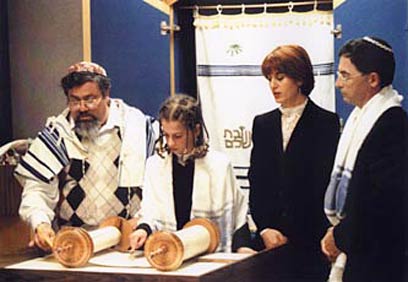
Branch of Jewish New York in Israel
After caring for Israelis in New York, director of UJA – Federation of New York – talks about Israeli, American Jews, Jewish experience
What makes an Israeli Harvard graduate come back to Israel? And how is it that, despite the life of abundance and prosperity offered by Manhattan’s Upper East Side, his heart, like that of the poet Yehuda Halevi, remains somewhere in the East, attracted to the social and religious conflicts which accompany tiny Zion?
Until a few years ago, the New York Jewish community did not know how to swallow the phenomenon of Israelis who had migrated there over the years. The results of a research commissioned by UJA – Federation of New York changed that picture.
Israelis with questions on education, identity
Uri Leventer-Roberts, the new director of UJA – Federation of New York in Israel, took a break to talk, minutes before his flight back to Israel, after seven years in the States. He discussed Israeli Americans, Jewish Americans, and everything in between.
“In New York there is a recurring phenomenon, throughout the United States as well," Leventer-Roberts said. "Israelis come all alone: this one completes a degree, the other one gets a new job, they try to assimilate into the American community. When children are born, questions of education and identity begin to emerge.”
“Regardless of return to Israel, the Israeli parent wants his child to eat Bamba, recognize Parpar Nehmad (a children’s tv show), and sing in Hebrew ‘our car is big and green,'" Leventer said. "Then groups of Israeli parents began to organize activities, a half ‘underground’ event where they turn to the nearby JCC (Jewish Community Center) and want to rent a room or hall.”
Surprisingly, it turns out that Israelis also provide a unique element for local young adults, which does not necessarily find its way out in the synagogue. Being Israeli offers its own way to connect. "This is not the initial position of ‘helping them integrate,’ but to see what they have to offer, and the communities themselves also joined the initiative.”
A reform synagogue began offering a monthly Shabbat ceremony Israeli-style, with hummus, falafel and Israeli music. "When you get there, you cannot identify who is Israeli and who is local. There are a lot of local Jews who are attracted to this atmosphere. Some are alumni of Taglit and want their child to learn Hebrew, and recognize the Israeli way of life, and of course, there are Israelis. This is definitely gaining momentum, and there are parallel initiatives in Los Angeles and Palo Alto."
Jewish startup specialist
Leventer indicates a striking difference between the Jews who migrated from Israel, to the Jews in the United States, rooted in Jewish identity.
"American Jews do not have the dichotomy of religious or secular, and there is place to be a Jew, and it was a great novelty to me," he says. "In Israel, you have the luxury to say I am an Israeli, without dealing with Jewish identity. In general, this topic has become so loaded politically and culturally, that people just do not want anything to do with it.”

'The US has many Jewish voices, enabling each person to experience the Judaism that speaks to him'
Leventer-Roberts’ two-year-old son has already begun taking his first steps in an Israeli kindergarten, and is learning to understand Hebrew, but the course of his life could have been very different. Leventer-Roberts was known, until a few years ago, as deputy editor of Channel 10 News, and a respected media personality. About seven years ago, he decided to begin graduate studies at Harvard's Kennedy School of Government, a decision that in retrospect changed the course of his life
“The ambition was, in the end, to move to Washington, D.C. and work in foreign relations," he says, "but then, just before graduation, I heard that Nachman Shai, then director of JFNA Israel, was taking journalists to Nashville for the umbrella event of the Jewish communities in North America, and somehow I knew I had to be there.”
“I approached one of the editors, and I suggested that I go on his behalf and cover the event. The feeling was crazy. There is a power to this thing: the number of people who arrive; the demonstration of strength and the major unity of Jews from the United States was an amazing thing.”
The conference experiences became, in the end, the article, "The Jewish start-ups of America." It examined the creative ways in which Jewish organizations connected the young with their Jewish identities. And like any good start-up, everything started by thinking outside of the box.
First time Torah lesson
Following the conference, Leventer-Roberts decided to move to the Big Apple with his wife, an American Jew he met during his studies in Boston. He wanted to experience this newly discovered Jewish world. He began a successful career as a consultant in communications and strategy for US companies, up to the outbreak of the recession. With the collapse of Lehman Brothers, he found himself in a new job at UJA – Federation of New York, the largest local Jewish organization in the United States, uniting the millions of Jews living today within its area of responsibility.
“The federation has a charming habit of starting meetings with a Torah lesson. As an Israeli," he admitted, "I tried to avoid it as much as I could. Every time I elegantly put the responsibility on someone else, until eventually, one of them told me directly, ‘Maybe next time you will do it?’”
Leventer-Roberts, who lived a life very far from classic Jewish texts, found himself flipping through the Jewish bookcase, and discovering an exciting new world. "It's not that I became a religious person," he says. "I do not go to synagogue regularly, and I do not keep kosher or observe the Sabbath, but last Purim, for example, I went to the Megillah reading, something I never did in Israel.”
”I do not know when the synagogue became alien to most Israelis, but the United States has many Jewish voices, enabling each person to experience the Judaism that speaks to him. And that is what I would love to bring with me to Israel. It will not be easy to return to the circles from which I came, and to be an ambassador of Jewish renewal and diversity, but that's exactly what I plan to do, though no doubt it is a tremendous challenge. Fortunately, in Israel today there are characters like Ruth Calderon and Micah Goodman, who present human bridges that open Judaism to Israeli society, in a way that has never existed before in Israel.”
Many ways to be Israeli in New York
The openness of American Judaism, the great variety of ways that it allows someone to be a Jew, is not supposed to be a Zionist solution for Israeli immigrants. "It is frightening to talk with the Israelis in New York about returning to Israel, or to mention to them the word ‘aliya,’ Leventer-Roberts admits. "They do not talk about it at all. The goal of the Federation was to assist those who are there. For those who want to return, there are other organizations. We are really not in this discourse of 'olim' and 'yordim'. The world is much flatter. Many Israelis live abroad today, and are still connected to Israel in a most significant way.”
“The Jewish people need, at any given moment, seven million Jews living in Israel, but they need not be the same Jews every time. Once it was obvious that the jazz musician who wanted to develop would need to spend a period of time in New York. Today that is true for hi-tech, science and academia. The only thing I hope, is to make Israel a place where Israelis want to live,” Leventer-Roberts said.
From statements to action: Leventer-Roberts will now be involved in the allocation of Some $30 million dollars invested by UJA – Federation of New York in Israel. "Even now wonderful things are being done all the time. The Israeli office never stops working: Taking care of the Ethiopian community, pre-military programs, working with at-risk youth, and a lot of good things have been done and are being done.”
“My goal is to focus the activity further. To partner with Israeli officials and share projects we are working on with them. To produce more and more connections between the Jews who are 'there' with those who live 'here.' Our country is both Jewish and democratic, and I believe that with the many Jewish voices and the stronger connection with the Diaspora, it will strengthen Judaism, but no less – and perhaps even more – it will strengthen the democracy,” he said.










